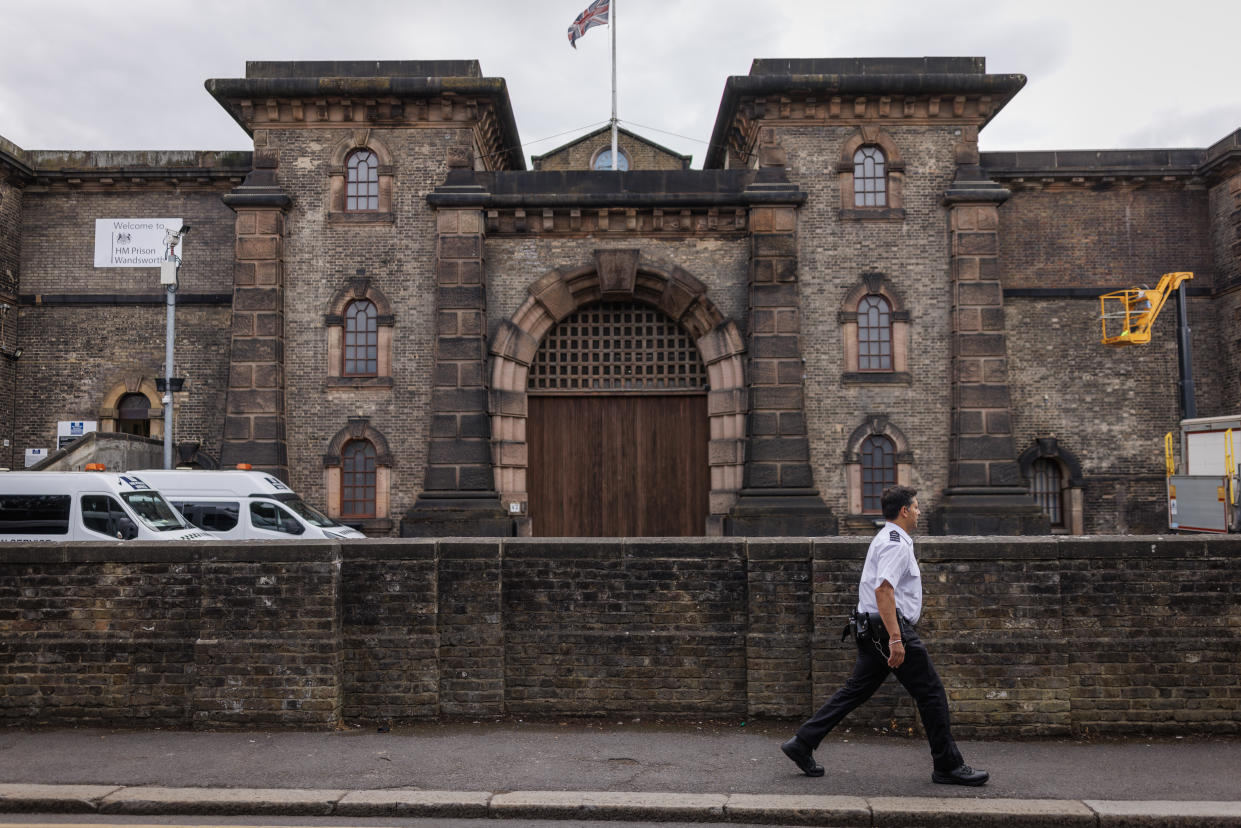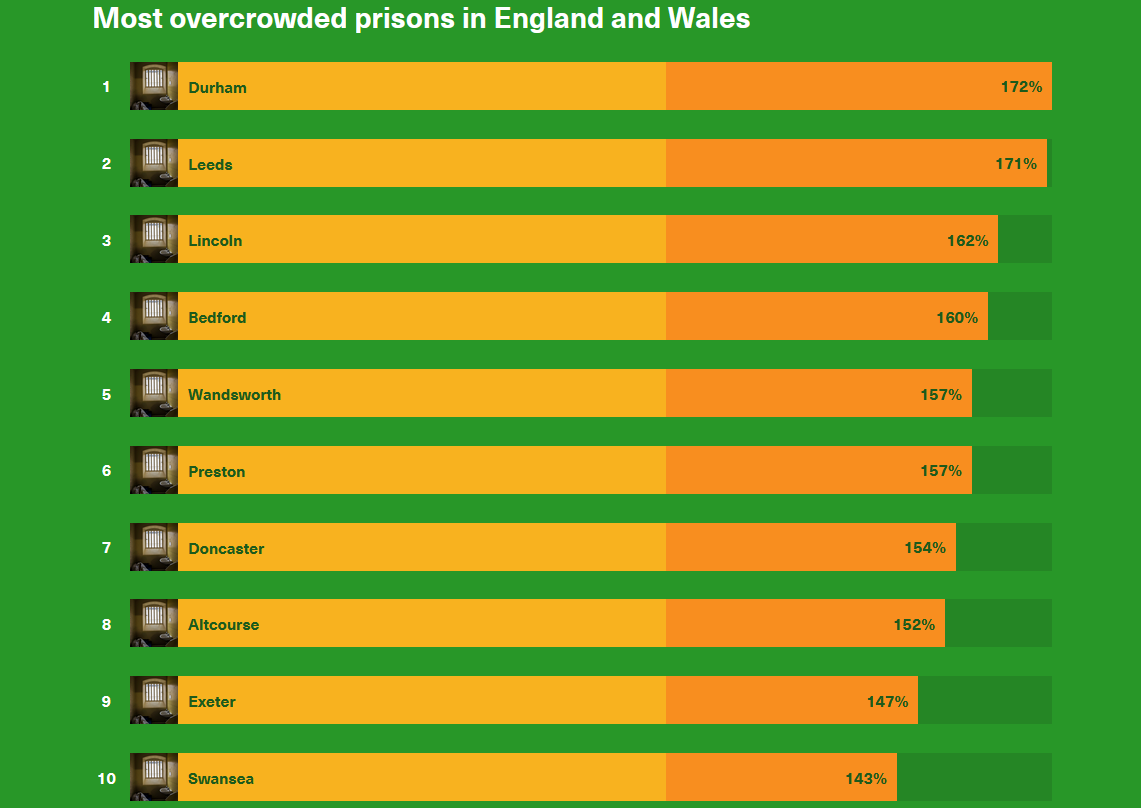How overcrowded are the UK's prisons?

The government has activated an emergency plan to ease prison overcrowding as more people continue to be sentenced for rioting.
Across the north of England, defendants waiting to appear in court will be held in police cells and not summoned to magistrates' court until prison space is available.
The plan, Operation Early Dawn, was activated on Monday morning and was previously used by the Conservative government back in May.
It will be put in place in the North East and Yorkshire, Cumbria and Lancashire, and Manchester, Merseyside and Cheshire regions.
More than 1,000 people have been arrested in connection with violent disorder following riots in England and Northern Ireland this month, which broke out after the fatal stabbings of three girls in Southport. More than 470 people have been charged with offences so far, the Crown Prosecution Service says.
Prisons and probation minister Lord Timpson said: “We inherited a justice system in crisis and exposed to shocks. As a result, we have been forced into making difficult but necessary decisions to keep it operating.
Read more: Labour has 'no choice' but to free prisoners who've served 40% of sentence, charity says
“However, thanks to the hard work of our dedicated staff and partners, we have brought forward additional prison places and now introduced Operation Early Dawn to manage the pressure felt in some parts of the country.”
National Police Chiefs’ Council custody lead, deputy chief constable Nev Kemp, said: “Policing will continue to arrest anyone that they need to in order to keep the public safe, including policing protests and events and ensuring that people are arrested as expected.”
However, Mark Fairhurst, national chairman of the Prison Officers’ Association (POA), warned the system could lead to police delaying operations.
Fairhurst, who blamed the previous government for the crisis, told BBC Breakfast: “It’s justice delayed at the moment, because we’re not clogging up police cells, so they might have to delay some of their operations."
How overcrowded are the UK's prisons?
The prison population in England and Wales is currently 87,893, according to the latest measure by the Howard League for Penal Reform.
This is in line with government figures, which puts Scotland's prison population at 8,000 and Northern Ireland's at 1,900.
"Under the Ministry of Justice’s own definition of safety and decency, the prison estate should not hold more than 79,856 people," said the Howard League, adding that 8,037 men and women are being held above this level.
"Overcrowding is not evenly distributed across the prison estate, so some prisons hold many more people than they are designed to do so safely," the campaign group adds.
Which prisons are most overcrowded?
Durham is the most overcrowded prison in England and Wales, with a population of 984 – 172% higher than the maximum of 573 for "certified normal accommodation (CNA)".
CNA is the number of prisoners that a cell can accommodate in uncrowded conditions which HMPPS believes are good and decent.
Leeds has a population of 1097, which is 171% over the maximum CNA standard of 641, while Lincoln is 162% over the limit with a population of 654 inmates.

In May, there was 8,365 prisoners in Scotland, the highest number since 2012, and over the country's operating capacity of 8,007, the BBC reports.
It is estimated around 6,500 of Scotland's prison population (74%) live in overcrowded conditions, according to STV.
Between 2000 and 2022/23 the prison population of Northern Ireland increased by 58%, according to Parliamentary research, As of March 2024, it was around 1,900 which was "historically high".
During ministerial question time in March, Northern Ireland's justice minister Naomi Long said: “In March 2021 the total population was 1,401. “On March 1 this year it had risen to 1,879, a 34% increase.
“Within that, about 36% of the prison population are unsentenced, so they are on remand."
What is Operation Early Dawn?
Operation Early Dawn is a contingency plan to help reduce prison overcrowding.
Under the scheme, HM Prison and Probation Service will assess each morning which defendants can be transferred from police cells and taken to courts.
It means defendants could be held in custody for an extra night instead of being brought to court if authorities are not confident that "safe and secure" prison space will be there for them after sentencing.
Those detained for "less serious" crimes are more likely to find themselves released on bail, while magistrates cases could be delayed to give priority to more serious cases.
The emergency measure will be used regionally where demand necessitates. Bail decisions will still be made by judges and the police, not the government.
Fairhurst said the scheme comes with significant downsides, telling the BBC: “You’re now clogging up police cells, so they haven’t got the power to arrest people and put them away in a police cell. It has a massive knock-on effect on the entire criminal justice system.”
Operation Early Dawn was previously triggered by the Conservative government in May in a bid to tackle overcrowding in jails.
How else is the government trying to free up prison space?
Justice secretary Shabana Mahmood announced plans to cut the proportion of the sentence inmates must serve behind bars from 50% to 40%.
The temporary move – which does not apply to those convicted of sex offences, terrorism, domestic abuse or some violent offences – is expected to result in 5,500 offenders being released in September and October.
Last Monday, the government confirmed those involved in recent unrest will not be excluded from its plans to release some inmates from jail early.
MPs have already approved the laws allowing the plan to be put into action and any changes could require updating the legislation in a short space of time if additional exemptions were to be included.
While the plan is controversial, Andrea Coomber, chief executive of the Howard League for Penal Reform, told Yahoo News in July that the newly elected Labour government had "no choice".
"Having inherited such a mess, they're having to take such drastic action... the whole system is about to collapse," she said.
The prison population in England and Wales rose this week. It now stands at 87,893. It has increased by 424 in the last seven days.
There are 84,283 people in men's prisons and 3,610 in women's prisons.https://t.co/dY3UNqgSWKpic.twitter.com/BA7WUu0fT8— The Howard League (@TheHowardLeague) August 16, 2024
Coomber suggested that there has been a "massive lack of strategy from successive governments about how to deal with people who break the law," adding that more emphasis is needed on prevention and rehabilitation, rather than retribution.
"Our prisons are definitely punishing places. We're good at punishing people. But we don't rehabilitate them. Our prisons have a lot of people in them that don't need to be there," she added.
In June, shortly after winning the general election, Labour pledged to deliver 14,000 new prison places in England and Wales.
This would be a continuation of the previous Conservative government, which pledged to build 20,000 new places by the mid-2020s but only created 6,000. It is understood the new spaces will be created through a combination of expanding existing prisons and building new ones.
However, earlier this week former chief inspector of prisons Nick Hardwick said the government should ditch the £4bn plan and instead spend the money on prevention and rehabilitation. “The basic problem is that people are coming into the system faster than they are going out," he told the Guardian. "If you think of it like a bath, the bath is overflowing and water is still coming in."


